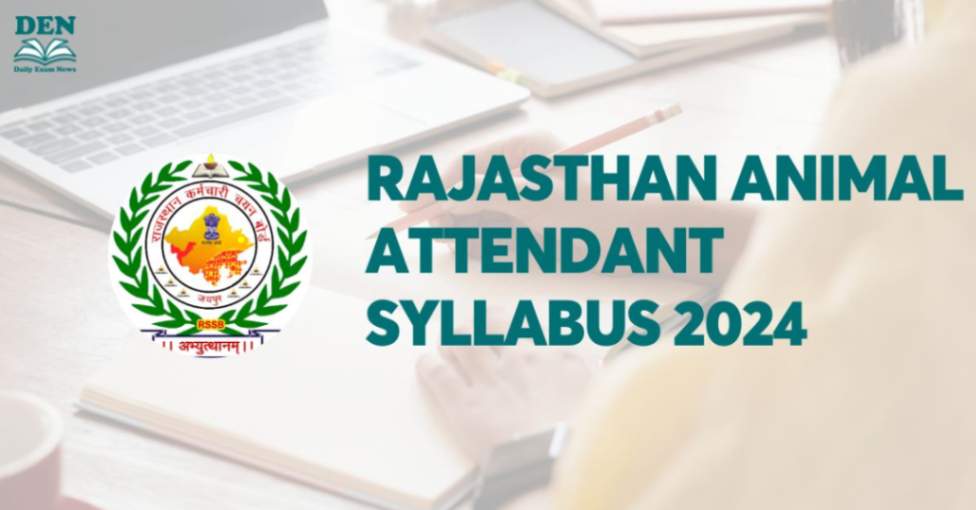The Rajasthan Animal Attendant Syllabus will be released by the Rajasthan Staff Selection Board before the exam to help the candidates prepare their exam preparation strategies. The Rajasthan Animal Attendant Syllabus 2024 provides a thorough curriculum for applicants studying for the Rajasthan Animal Attendant test. This syllabus serves as an essential guide, outlining the courses and topics that will be covered in the exam. It contains sections on animal husbandry, veterinary science, fundamental animal care procedures, and general knowledge about Rajasthan’s rural and agricultural setting. The course is designed to provide applicants with the information and abilities they need to properly fulfill their obligations in the field of animal care and management. Understanding this syllabus is vital for students to strategize their preparation, focus on key topics, and maximize their chances of success in the examination.
Rajasthan Animal Attendant Syllabus 2024
The 2024 Rajasthan Animal Attendant Exam will be divided into two portions, each covering a distinct subject. Topics covered include general knowledge of Rajasthan, mathematics, and animal husbandry/veterinary science. The topics will include significant sources of Rajasthan’s history, prehistoric civilizations in Rajasthan, major dynasties and their achievements, Mughal-Rajput relations, important forts, monuments, structures, animal behavior, animal husbandry, livestock management, hygiene, sanitation, veterinary care, and more.
Rajasthan Animal Attendant Syllabus for General Knowledge of Rajasthan
| Topic | Subtopics |
| Major Sources of Rajasthan’s History | Ancient manuscripts, inscriptions, historical texts, and archaeological findings |
| Major Dynasties of Rajasthan and their Achievements | Gurjara-Pratihara, Chauhans, Sisodias, Rathores, and their contributions to administration, architecture, and culture |
| Mughal-Rajput Relations | Alliances, marriages, conflicts, and cooperation between Mughal emperors and Rajput kings |
| Main Features of Architecture | Indo-Islamic architecture, Rajputana style, forts, palaces, temples, havelis |
| Important Forts, Monuments, and Structures | Amber Fort, Chittorgarh Fort, Mehrangarh Fort, Jaisalmer Fort, Hawa Mahal, City Palace, Jantar Mantar |
| Major Works of Rajasthani Language, Literature, and Regional Dialects | Dingal and Pingal poetry, works of Kavi Kumbha, Dursa Arha, Bihari, and other notable poets |
| Rajasthani Idioms, Proverbs, and Sayings | Commonly used idiomatic expressions, proverbs reflecting cultural wisdom, and traditional sayings |
| Fairs, Festivals, Folk Songs, Music, Folk Dance, Musical Instruments, and Jewelry of Rajasthan | Pushkar Fair, Teej, Gangaur, Kalbeliya dance, Ghoomar, Kathputli, traditional instruments like Sarangi, and Rajasthani jewelry styles |
| Rajasthani Culture, Tradition, and Heritage | Traditions, rituals, attires, customs, and daily life practices unique to Rajasthan |
| Important Historical Tourist Places of Rajasthan | Jaipur, Udaipur, Jodhpur, Jaisalmer, Mount Abu, Ranthambore, Bikaner |
| Prominent Personalities of Rajasthan | Maharana Pratap, Mirabai, Rao Jodha, Bhama Shah, Rajmata Gayatri Devi, Prithviraj Chauhan, G.D. Birla |
Rajasthan Animal Attendant Syllabus for Veterinary Science
| Topic | Subtopics |
| Major Native Breeds of Animals in Rajasthan | Rathi, Tharparkar, Gir (cattle); Marwari, Kathiawari (horses); Sirohi, Barbari (goats); Chokla, Magra (sheep) |
| Artificial Insemination | Techniques, benefits, equipment used, semen storage |
| Castration | Methods, benefits, age for castration, post-castration care |
| Hybrid Breeding | Crossbreeding techniques, benefits, popular hybrids |
| Milk Exploitation and Milk Secretion Period | Lactation cycle, factors affecting milk production |
| Clean Milk Production | Hygienic practices, equipment sanitation, milk storage |
| Animal and Poultry Management, Disposal of Organic Wastes | Housing, feeding, waste management practices |
| Balanced Animal Feed | Nutritional requirements, feed composition, feeding schedules |
| Forage Crops, Fodder/Pasture Development | Types of forage crops, pasture management, silage and hay making |
| Identification of Healthy and Sick Animals | Symptoms of common diseases, physical examination techniques |
| Internal and External Parasitic Diseases in Animals | Common parasites, prevention, and treatment methods |
| Vaccination in Animals | Types of vaccines, vaccination schedules, importance |
| Livestock Propagation, Health Calendar of Sheep and Goats | Breeding cycles, health check schedules, disease prevention |
| Production and Location of Wool, Meat, Milk, and Eggs in the Country and State | Key production areas, contribution to economy |
| Availability of Milk/Meat/Eggs per Person | Consumption statistics, nutritional significance |
| Milk Productivity per Animal | Factors influencing productivity, breed-specific data |
| Wool Shearing, Load-Carrying Animals | Shearing techniques, care of sheared sheep, use of animals for transportation |
| Vermicompost Fertilizer | Production process, benefits, use in agriculture |
| Use of Animal Skin and Bones | By-products, industrial uses, ethical considerations |
| To Find Out the Age of Animals | Dentition, other age determination methods |
| Harm to Animals/Environment Due to Polythene | Environmental impact, health risks, preventive measures |
| Animal Insurance | Types of insurance, benefits, claim process |
| Precautions to be Taken While Purchasing Animals | Health checks, breed verification, legal documentation |
| Animal Fairs | Major fairs, purpose, economic impact |
| Animal Census, Cowshed Management | Data collection methods, importance, barn hygiene practices |
| Importance of Cleanliness | Disease prevention, hygiene protocols |
| Proper Execution of Cow Dung Urine | Manure management, biogas production |
| Marketing of Livestock Products | Market trends, value addition, sales strategies |
| Dairy Development Activities, Major Schemes of Animal Husbandry Department | Government initiatives, support schemes, impact on livestock farming |
Rajasthan Animal Attendant Exam Pattern 2024
The Rajasthan Animal Attendant Exam Pattern for 2024 contains crucial data such as total marks, marks per question, total number of questions, negative marking for incorrect answers, minimum qualifying marks, and the exam length. The test question paper is broken into two parts: Part ‘A’ is weighted at 70% and Part ‘B’ is weighted at 30%. Refer to the table below for a comprehensive knowledge of the Rajasthan Animal Attendant Exam Pattern 2024. This information is critical for applicants preparing for the examination.
- The exam will be held in offline mode.
- The written examination will include objective-type questions.
- The written exam will consist of 150 questions.
- Each question will carry one mark.
- Each wrong response will result in a 1/4th negative marking.
| Parts of Question Paper | Total No. of Questions | Total Marks | Time Duration |
| Part A | 105 | 105 | 3 Hours |
| Part B | 45 | 45 | |
| Total | 150 | 150 | 3 Hours |
Check here for more information-
Hopefully, this information was useful for all the aspiring candidates preparing for the government exams. Check DailyExamNews to stay informed about the latest recruitments, tests, vacancies, and developments regarding government exams.

